Martha Roby: Creating and protecting new ideas
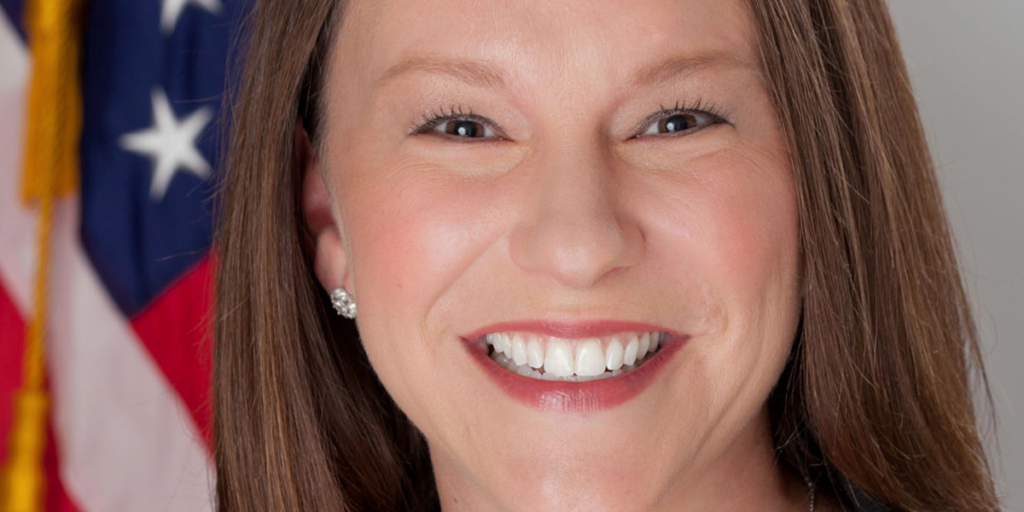
Congresswoman Martha Roby discusses the state of intellectual property protections in the United States.
Velocity Accelerator companies start ‘boot camp’ at Birmingham’s Innovation Depot

Seven high-growth companies are one week into a 13-week intense “boot camp” of development that organizers believe is key component to the tech-sector economic development efforts to drive Birmingham forward. Velocity Accelerator introduced its seven cohort companies to the public this week. This is the third class of cohorts to go through the program at Innovation Depot. The companies range from startups to a 14-year-old business. What all of them have in common is that they’re established with a product and revenues and a diversity that is seen as part of the secret sauce that makes Velocity Accelerator work. “We intentionally don’t focus on one industry sector,” said Devon Laney, CEO of Innovation Depot. “I think it’s part of the strength of the program to have diversity in the industries and the sectors and to be able to attract companies from outside of Alabama to Birmingham and hopefully stay when they get done.” The past two Velocity Accelerator classes taught organizers that having companies at the same stage in their development was also important. “We wanted companies that were all at a very similar place – companies that all had revenue, they all had products,” Laney said. “They were all at a very similar stage so that the curriculum of the Velocity program would be applicable throughout the program at the same time to all of the teams so that they could move through the program sort of together, really, in a lot of ways, and progress at the same pace throughout the program.” This year’s cohort companies are: Fanboard was founded in Atlanta by Morgan Drake, Josh Fisher and James Simpson and marries augmented reality with live events like sports and concerts S(w)ervice was formed in Birmingham by Thomas Walker and Warren Wills and offers an on-demand auto maintenance solution with appointment bookings and vehicle valet services. Babypalooza is a Birmingham company founded by Cecilia Pearson that is a parenting platform where live events intersect with technology to make it easy for new, expectant and hopeful parents to access the products, people and parenting information they need most. Uptime Dynamics was founded in Birmingham by Thomas Smillie, Tom Woodruff and Maggie Belshe to redefine what a computerized maintenance management system can do for manufacturers. Need2Say was started in Birmingham by Oscar Garcia with the mission of helping you communicate what you Need2Say in your second language so that you will realize your full potential in school, work and daily life. Milk the Moment was founded in Nashville by Courtney “Coko” Eason and uses the MILK App, which rewards you whenever you refrain from using your phone in places or situations where we all could be a little more present, intimate, focused and safe. Fledging was formed in Birmingham by Weida Tan and Steven Robbins and produces premium electronics like storage products, such as its flagship product, Feather SSD (Solid State Drive) for Mac devices. Over the next several days, Alabama NewsCenter will feature each of the companies in this year’s Velocity Accelerator program. Laney said companies from all over the world applied to be part of the new Velocity Accelerator cohort, bolstered by the successes of the previous two classes. The initial Velocity Accelerator in 2017 had nine companies, three of which had raised additional capital by the end of the program and two more have done so since. In 2018, there were seven companies, five of which raised follow-on capital and two of them from out of state relocated and stayed in Birmingham. “We’re looking at this as economic development,” Laney said. “We see this as a pipeline of growth companies that we can help support, attract to Birmingham and retain.” Laney said the first two Velocity Accelerator cohorts took the $1.5 million invested in them and have leveraged that seed investment to raise more than $8 million and create over 70 jobs in the past two years. “The return on the investment from the private sector, I think, is phenomenal,” Laney said. Several of this year’s cohorts were well aware of the past success and cited it as a reason for wanting to participate in the intense Velocity Accelerator program. “I’m proud of the history,” Laney said. “I’m glad that now we have something to build on and that other entrepreneurs and other startups can see the history and say, ‘Yes, I want to be in Birmingham. Yes, I want to go through Velocity because I understand the potential I have there to grow my business.’” The 2019 cohort kicked off Jan. 28 and concludes April 30 with Velocity Demo Day at Iron City, where each company will pitch to potential customers, investors and community supporters. Participants in the program receive $50,000 each from the Velocity Fund, which is supported by Alabama Power, Regions Bank, BBVA Compass, Blue Cross and Blue Shield of Alabama, Protective Life, UAB, the Community Foundation of Greater Birmingham, Encompass Health, EBSCO, Brasfield & Gorrie, McWane, Altec and Hoar Construction. Laney said the support from the private sector is part of the buy-in that has been critical to the program’s success. “The program is great. The curriculum is great. We’ve done a good job with all of those things, I think,” Laney said. “The community support and the buy-in from the community is the reason that Velocity is successful.” Having the corporate community provide dollars and not just lip-service of support is a key to creating a sustainable innovation economy, Laney said. “It speaks volumes. It’s a difference-maker for us.” Republished with permission from Alabama NewsCenter
Daniel Sutter: Rental scooters and innovation
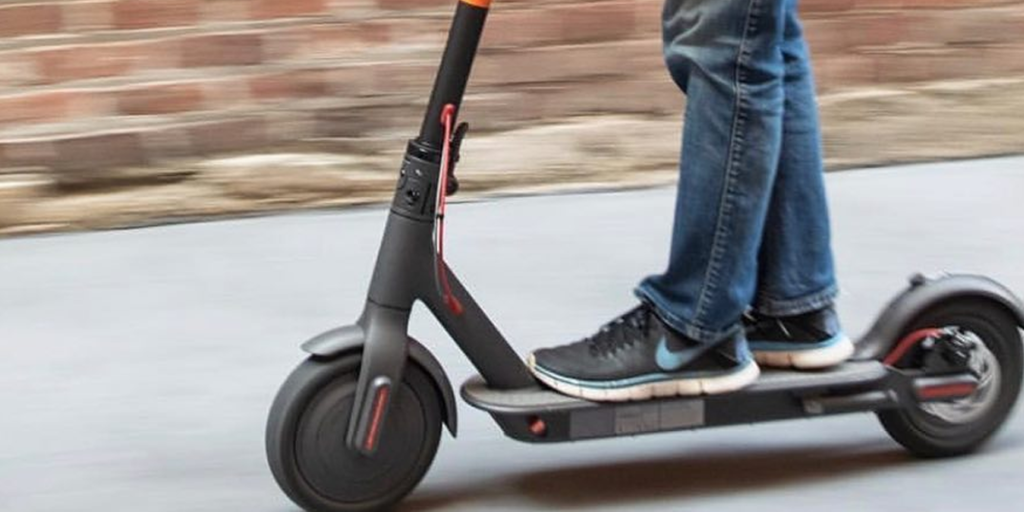
Rental bikes and scooters came to Troy University this fall, courtesy of the rental company Spin. Similar efforts by Spin, Bird, and Lime across the country, however, have met with controversy. The so-called “Scooter Wars” reflect how government permission affects innovation and growth. Technology makes such rentals, long available in resort locales, economical. The companies use GPS tracking and electronic billing, and rentals can be unlocked by scanning a driver’s license. People leave the bike or scooter at their destination and an app directs customers looking for a ride to the nearest rental. The companies use public spaces like sidewalks to “store” their rental units. This makes the rentals convenient for customers, as walking several blocks to and from rental locations would offset most of the time savings on short trips. Yet bikes and scooters clogging sidewalks have contributed to hostile reactions. Numerous cities have banned the scooter companies, including Miami (which banned Bird and Lime within weeks), Seattle, Boston, Nashville, and St. Paul. The bans have occurred in part because the companies entered some cities by just dropping off bikes and scooters on the streets for use. And Miami’s ban may not be permanent; Denver, Portland, and Salt Lake City all eventually permitted scooter rentals after initial bans. The government permission of relevance is more than simple business licenses, which are generally issued upon completion of required paperwork and payment of relevant fees. Instead, the permission requested here can be denied altogether. And this alters the prospects for innovation in our economy. Should scooter companies need permission slips from cities? This is where the “Scooter Wars” highlight an important tension. Are people free to do whatever the law does not prohibit? Or do we need permission from government to start new businesses, offer new products and services, or use our property as we wish? Rentals undoubtedly raise some valid concerns. Increased bike and scooter use can affect traffic safety. The rentals take up space on sidewalks, interfering with pedestrians. They could obstruct building entrances. Wouldn’t it be wise for city officials to evaluate the tradeoffs involved and impose rules to reduce potential problems? Yes, but unfortunately requiring government permission does not produce only wise and benign oversight. Government permission empowers a NIMBY, or Not in My Backyard, society. NIMBY becomes the default response when people can object to a new venture for any reason, good, bad, or imagined. Do you find scooters unsightly, annoying, or threatening? Then pressure city officials to ban them. Requiring government permission also allows economic interests to block competition. Economist Joseph Schumpeter described capitalism as a process of creative destruction: automobiles, cell phones, and email rendered horse-drawn buggies, landlines, and traditional mail largely obsolete. Existing businesses, often long-standing pillars of local economies and politics, have an interest in preventing innovation. If local governments must give permission, people’s natural NIMBY reaction and existing business’ interests create biases against innovation. The scooter companies resorted to surprise deployments as a means, I think, of counteracting government’s status quo bias. Miamians took 30,000 trips on Lime scooters while they were available, and these users also spoke to city officials. The ride sharing company Uber similarly sought to develop loyal local customers to fend off local political efforts to ban ridesharing. Progress requires innovation, even though the new and different can be frightening. Unfortunately, the need to get government permission becomes a formula for stasis, as Tyler Cowen examines in The Complacent Class. And dynamic innovation doesn’t mix well with permission. Computers and technology have been leading sources of innovation in recent decades in part because innovation here often still doesn’t require permission. Personally, I’m too uncoordinated to try to use an electric scooter. So don’t expect to see me on a Spin scooter soon. But regardless of your age or coordination level, the Scooter Wars’ clash between NIMBY and innovation matters for us all. ••• Daniel Sutter is the Charles G. Koch Professor of Economics with the Manuel H. Johnson Center for Political Economy at Troy University and host of Econversations on TrojanVision. The opinions expressed in this column are the author’s and do not necessarily reflect the views of Troy University.
Deadline near for ‘Rise of the Rest’ Birmingham startup competition for $100,000
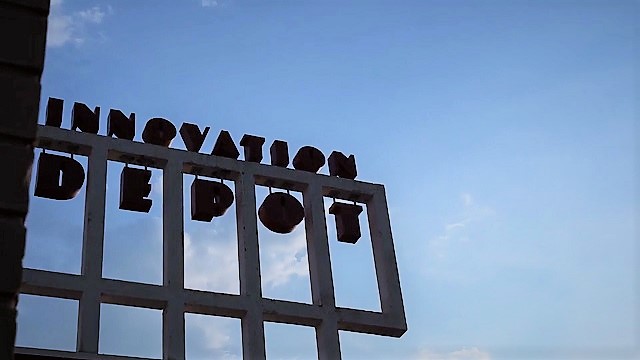
Birmingham area startups have only a few days left to be considered for a $100,000 investment from “Rise of the Rest” founded by Steve Case. Birmingham is among five cities chosen for the America Online founder’s latest initiative aimed at championing innovation ecosystems in the U.S. The Rise of the Rest bus tour arrives in Birmingham May 9, but the deadline for startups to apply for the six-figure prize is March 20. Interested companies are encouraged to go to the website and apply. Birmingham Mayor Randall Woodfin said having Rise of the Rest in Birmingham is great exposure for what is happening in the Birmingham entrepreneurial scene but the $100,000 could make a major difference for a company on the rise. “This is an amazing opportunity for local startups because now we get a chance to highlight and showcase what they’re already doing so well,” Woodfin said in the video below. “They deserve national exposure.” The tour stop in Birmingham also features Google for Entrepreneurs, a longtime Rise of the Rest partner, which will provide coaches to help startup founders with their investment pitches. Republished with permission from the Alabama NewsCenter.
University of Alabama granted patent for sideline privacy tent
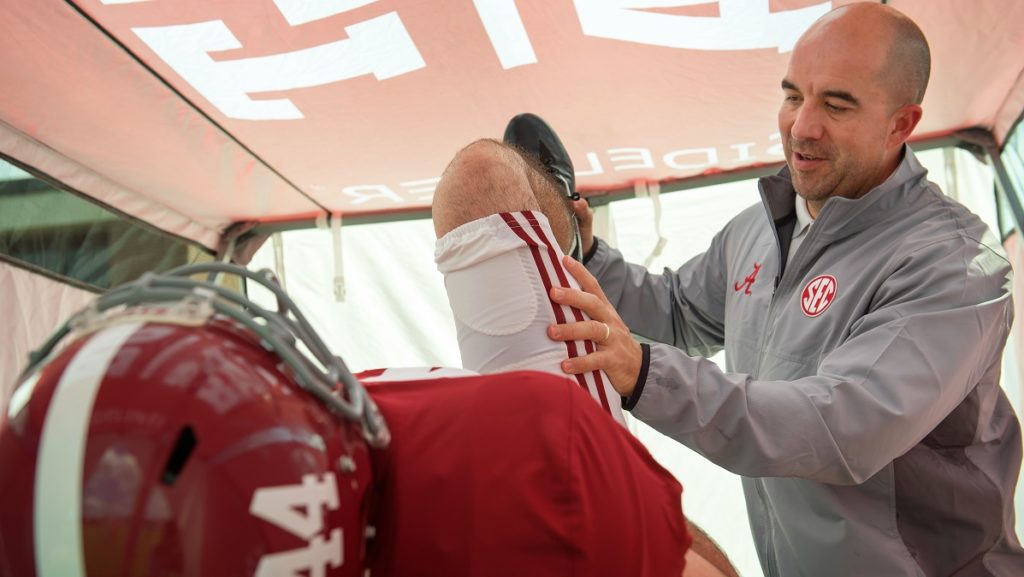
By: Adam Jones | University of Alabama The University of Alabama was recently awarded a patent for a medical privacy tent developed by engineering students and Crimson Tide Athletics, firmly protecting the tent’s unique capability to easily expand or collapse on the sideline of a football field. “The patent clearly adds another layer of protection to what we feel like is a unique idea,” said Jeff Allen, director of sports medicine at UA, who was part of the team that developed the tent. Now called the SidelinER, it can set up within seconds without blocking the view of fans watching the game. Most of the game, the tent is collapsed onto the ground, but if an injured player needs an evaluation by the medical staff, it quickly expands over the examination table. Debuting on the sidelines of Bryant-Denny Stadium in 2015, the SidelinER was used on every sideline in the NFL and by the bulk of major college football teams during the past season. “It’s taken off because physicians and athletic trainers recognize the definite need for a product like this on their sideline,” Allen said. “It’s very easy to operate and easy to use, so people see it can be beneficial.” Addressing a need In 2016, UA’s Office for Technology Transfer licensed the technology to Kinematic Sports, a company formed by Allen and two of the engineering students, Jared Cassity and Patrick Powell, who worked on the senior design project. The United States patent was granted Jan. 2, covering the collapsible and portable design. Allen, Cassity and Powell are the inventors, along with Jared Porteous and Christian Parris, the other two engineering students on the project. They all graduated in 2015. “When the technology was presented, it was clear the idea would directly address a need in the market, so we are thrilled the SidelinER is helping improve treatment of athletes,” said Dr. Rick Swatloski, director of the Office for Technology Transfer. “UA is fortunate to have incredibly innovative faculty, staff and students who generate this and many other innovative technologies.” Allen said his original intention was for the students to create a tent his staff could use for Crimson Tide football games. The finished product turned out to work so well that first season it garnered the attention of the media and the sports medicine and training community. Being on the sideline of a visible football team and flagship university helped, he said. “There’s no question the way the SidelinER has taken off would not have happened without the power of the script ‘A,’” said Allen, referencing UA’s crimson logo. “That ‘A’ is powerful. The support of this university has been incredibly beneficial.” A better exam After three seasons with the SidelinER, Allen said it has become a critical part of sideline medical care. “I can’t believe we did this without the SidelinER,” he said. “I clearly knew there would be a benefit to privacy, but I didn’t realize how much it would improve our medical exam on the sideline. The medical staff and the athlete are much calmer in a private environment, and we get a better medical exam than we used to get.” Kinematic Sports has space in The Edge, a business incubator in downtown Tuscaloosa that is a joint project between UA, the city of Tuscaloosa and the Chamber of Commerce of West Alabama. Cassity leads the company, which is becoming a job creator for the area. “The Edge has been an incredible benefit for us,” Allen said. “We’re proud to be in the city of Tuscaloosa and to be associated with the University of Alabama.” Allen hopes the SidelinER can continue its momentum in college sports as well as prep football with possible applications in emergency response and the military as future markets. This story originally appeared on the University of Alabama’s website.
Best of Alabama innovation stories of 2017
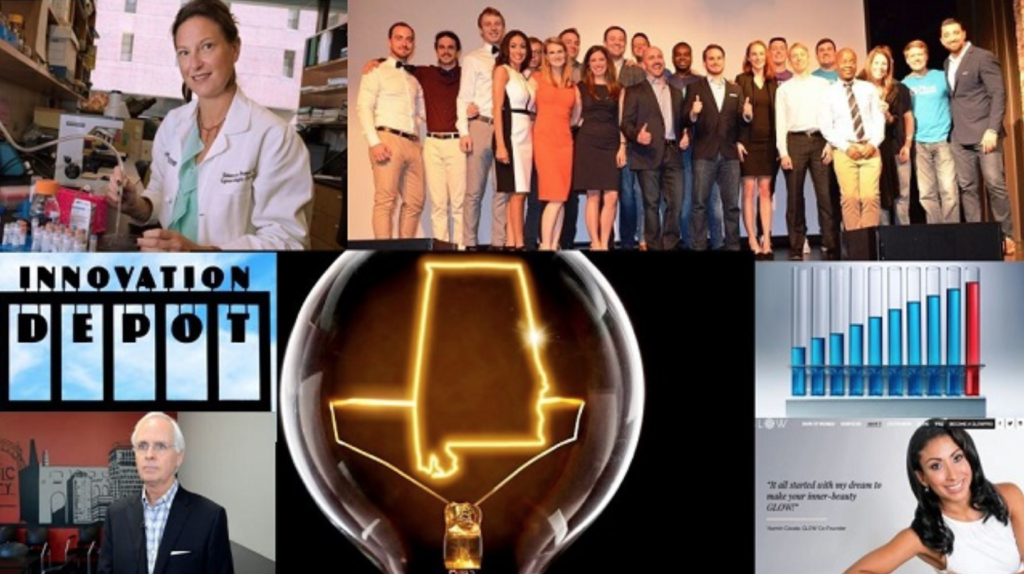
As we watch 2017 give way to 2018, it’s a good time to look back on some of the great things that happened in Alabama this year. Alabama NewsCenter has tallied the results in each grouping of stories to see which ones you responded to the most, and we’re sharing your five favorites along with a story (or stories) we wanted to make sure you didn’t miss. If 2017 had a signature buzz word or phrase, it may well have been the “innovation economy.” Alabama cities were certainly touting their own place within the innovation economy, and the evidence was in the actual innovation taking place in the state. Here are the Top 5 Alabama NewsCenter innovation stories for 2017: Researchers believe immunotherapy could be the best way to fight many forms of cancer in the future, but not all patients’ bodies respond to immunotherapy with prolonged, promising results. UAB is spearheading research to better prime the body for immunotherapy so it can achieve better results. For the first time ever, Birmingham hosted Venture for America in its apprenticeship matching event. More than 40 companies interviewed 200 of the best and brightest VBA fellows to find them internships with innovative companies in Birmingham, San Antonio, Nashville and New Orleans. Another major innovation feather in Birmingham’s cap this year was playing host to the national e.Builders Forum. The International Business Innovation Association held the two-day event at Birmingham’s Innovation Depot in September. Innovate Birmingham has been a priority for the Birmingham Business Alliance and its partners for the past few years, but the program took a major step forward with the hiring of Bob Crutchfield as its executive director and an official roll-out during Birmingham Innovation Week. Although it didn’t make the final cut, Birmingham was one of 10 cities on the semifinalist list in the Smart Cities Challenge from the Smart Cities Council. Winners of the Smart Cities Readiness Challenge Grants were Austin, Indianapolis, Miami, Orlando and Philadelphia, but by being in the running, Birmingham signaled its growing presence in the national and global innovation economy. Editor’s choice: While we like to acknowledge big-picture innovation and the state’s place in the innovation economy, the best innovation is in those gee-whiz ideas from the innovators themselves. This year was the inaugural class of Birmingham’s Velocity Accelerator program that helped nurture new ideas from innovative entrepreneurs. Some were from Birmingham or other parts of Alabama, while many were not. We brought you each of their stories. Click here to read more. Republished with permission from Alabama NewsCenter.
New business incubators to spark innovation across Alabama
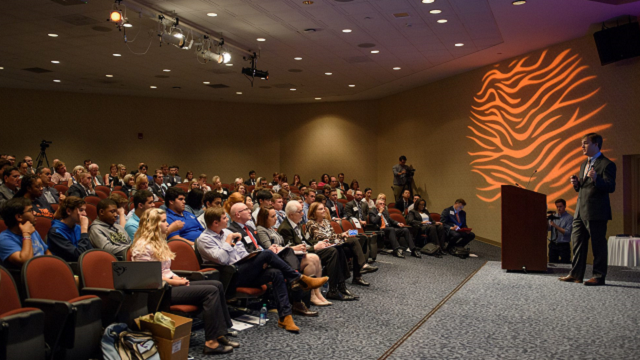
Alabama universities are providing new launch pads for entrepreneurs and their innovative business ideas across the state. Several new incubators have opened or are in the works, and all of the projects have the potential to help spin out new jobs and investment for local communities. Technology Villages At the University of Alabama, the Technology Villages program has kicked off with two partner cities – Cullman and Fairhope – and the goal of creating entrepreneurial hubs that will fuel tech business growth. The program is a “unique bend on economic development” that will be especially useful in small and rural communities that don’t have a lot of money to spend on business recruiting efforts, said Dr. Rick Swatloski, director of UA’s Office for Technology Transfer. “Successful communities are required to continue to aggressively recruit new companies, but also diversify to support vital new small company growth that represents over half of new jobs created in the United States today,” he said. “We look forward to communities, private companies, federal agencies, individuals and Alabama corporations joining the university in this critical job creation mission.” The Technology Villages program assists communities in building and operating storefront technology-focused incubators. In Cullman, the city has renovated a 2,200-square-foot space for its Village in the downtown business district, and in Fairhope, BBVA Compass has pledged space for the Village, also downtown. The goal of the centers is not to be traditional incubators; rather, they will function as startup resource hubs for distance learning and consultant support. The university also will provide business development services, including help with research, patents and contract manufacturing strategy. “Both communities have secured initial funding for the program and identified the location,” Swatloski said. “The next critical step for both will be the hiring of a director to oversee the day-to-day operations. Additionally, the communities are continuing to identify additional key partnerships to help ensure the sustained success of the program.” Technology Villages is based on a five-year pilot program conducted by Clemson University in five South Carolina cities. In the first 18 months of that initiative, programs in Bluffton and Rock Hill created more than a dozen companies and nearly 70 new jobs. Tiger Cage Accelerator Meanwhile, Auburn University recently opened the Tiger Cage Accelerator and Incubator, a 2,700-square-foot space at the Auburn Research Park that provides student-led startups with office and meeting space, along with access to mentors.The facility is a collaborative effort between the Harbert College of Business’ Lowder Center for Family Business and Entrepreneurship and the Auburn University Research and Technology Foundation. Harrison Evola is a recent Auburn graduate and founder of FetchMe, a concierge delivery service that has experienced significant growth over the past year. Evola has been using the incubator space for his business operations, and he has also participated in Auburn’s Tiger Cage student business pitch competition. “The Tiger Cage center is so helpful,” he said. “I have a place to meet with employees, keep my work stuff, work 24/7 and I’m surrounded by other kids who have ambition like me as well.” The idea for FetchMe was born when Evola was a teenager working for Papa John’s Pizza, where he did everything from making and delivering pizzas to washing dishes and helping customers. “I liked interacting with people, and I thought it would be cool to own my own business. I took that thought and applied it to FetchMe,” he said. The startup, which delivers restaurant food, groceries, snacks, coffee and more, made its first delivery a year ago. Today, the firm does 1,500 orders per month and has partnered with more than 25 restaurants in the Auburn area, with plans to expand further. A complete list of partners and services can be found at FetchMeDelivery.com. Invention to innovation At the University of Alabama in Huntsville, construction is underway on the D.S. Davidson Invention to Innovation Center (I²C), which will serve as an incubator for entrepreneurs and new business development in the region. The three-story, 46,650-square-foot building is expected to be complete by early 2019, and it features easy access to UAH’s College of Business, as well as the university’s library, engineering, and science and technology facilities. The facility’s mission is three-fold: stimulating growth of new and existing science and engineering high-tech companies; catalyzing formation of a resilient entrepreneurial ecosystem in the northern Alabama and south central Tennessee regions; and building partnerships with various entrepreneurial ecosystems and hubs to create pathways that empower, ignite and motivate the community to make ideas happen. “I²C facility and programs will support entrepreneurs on building scalable, investable, high-growth, technology-focused businesses that will serve as catalysts for economic development and regional innovation,” said Rigved Joshi, who oversees strategy, programming, partnerships and daily operations at the center. The incubator is named for Huntsville businesswoman and philanthropist Dorothy S. Davidson, who made a $5 million gift to UAH in support of the project. Other funding came from the Alabama Department of Commerce’s Innovation Fund, Madison County Commission, City of Huntsville, UAH Foundation and U.S. Department of Commerce’s Economic Development Administration. Davidson, who is chief executive and board chairman of Huntsville’s Davidson Technologies Inc., said she knows how hard it is to start a business when you don’t have the support you need. Most people fail, she added, not because they don’t have the technological expertise but because they lack business skills. In the new incubator, small business owners will benefit from the university’s expertise and the proximity of peers at Cummings Research Park. “They won’t necessarily compete with the businesses in Huntsville, but they will be coming out with innovative ideas to improve what’s already here with help from the university,” Davidson said. “That will make the incubator an open door to creating small businesses, giving those with innovative ideas a place to go, get set up and develop more technology.” This story originally appeared on the Alabama Department of Commerce’s Made in Alabama website. Republished with permission from the Alabama NewsCenter.
Blake Dowling: Who knows what innovation will bring next?
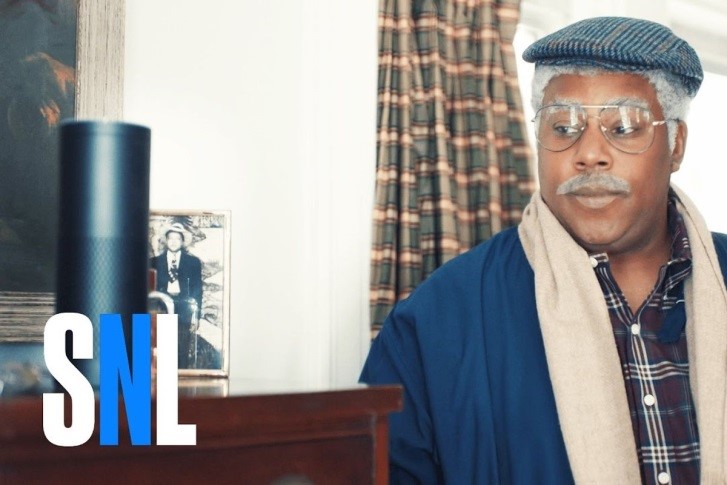
Have you checked out the latest version of the digital personal assistant, Alexa, that is specially designed for Senior Citizens? It’s called Alexa Silver. It’s super loud and you can only order it by check. It also has an “uh huh” function that it says when you are telling rambling stories. Fake news alert, it’s actually from an SNL skit. Awesome to see Lorne Michaels and his team still cranking out gold after all these years, watch it here. (Shoutout to Normie for sharing this with me.) Speaking of new ideas and innovation, in business and politics, the past decade has been piled with new ways of doing things. How we campaign, work, lobby, organize, motivate, influence all has a digital twist to it. So many devices; all working together seamlessly, most days. I now have reached device overload with my tech: Desktop PC (multiple monitors), iPad, 2-in-1 tablet/laptop, and phone. Plus keyboard, speaker, and lots and lots of wires. The functionality and mobility of all of this makes me extremely productive (on a good day) but, man, I could use some innovation in lowering my device count. Speaking of innovation, I had an opportunity this week to judge a regional SharkTank-like competition in North Florida. The competition is called the Innovation Park Tech Grant Program, Applicants brought amazing ideas to the table regarding weather forecasting, video production, engine management and health care. The local community really rallied around the event and the everyone got a chance to engage with the innovators before the actual judging began. This specific program has been around since 2005 and they have given out over $400,000 in grants to date benefiting the entrepreneurial ecosystem in Leon County. I first met the Leon County Research & Development Authority when I spoke to one of their events on artificial intelligence. They read one of my columns on this badass, award-winning political website called, FloridaPolitics.com (perhaps you have heard of it?) When they mentioned the competition and asked me to judge, I agreed as they said the magic words: “Free beer.” In all seriousness, though, it was an honor to review these companies (check them out here). I asked the Director of Programs and Communications about her thoughts on the event; she said: “The Innovation Park TechGrant Program is open to all Leon County residents and offers a change to help local startups and early stage companies transform their ideas and hard work into commercialized products. Funding is one of the largest battles these companies face and we enjoy helping companies in our community move forward.” Pretty cool. Where would we be without the innovators of today and yesterday, no Lobby Tools, no iPad, no Alexa Silver, no cloud, no WatchESPN app on my phone? The world has certainly changed since I kicked off my career in the rock ‘n’ roll business — back in the Dark Ages of the pre-smartphone world of 1998. Who knows what this local and global community of innovators will bring us next. I can’t wait to find out, and hopefully, I won’t need the Alexa Silver any time soon. Enjoy the weekend. ___ Blake Dowling is CEO of Aegis Business Technologies and can be reached at dowlingb@aegisbiztech.com.

